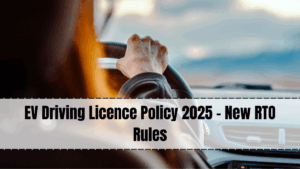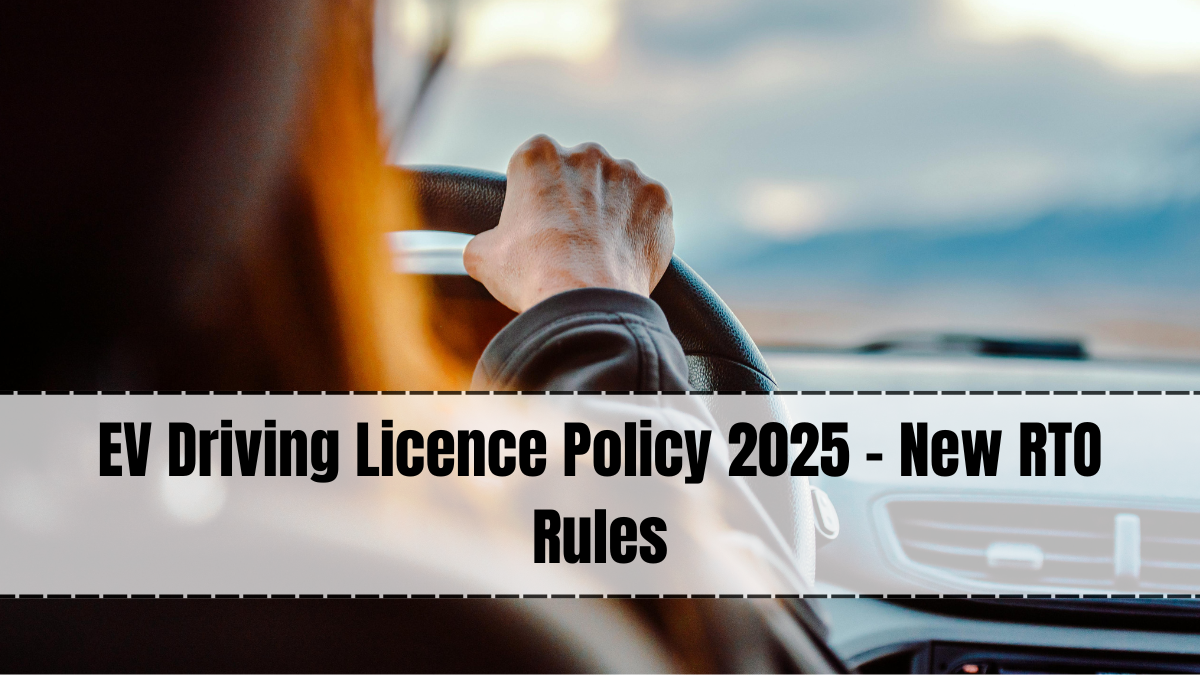The EV Driving Licence Policy 2025 introduces updated procedures for obtaining a driving licence for electric vehicles in India. With the rapid growth of the electric mobility sector, the RTO (Regional Transport Office) has revised its rules to ensure drivers are well-trained to handle EV-specific features and safety requirements.
The move comes as India’s adoption of electric two-wheelers, cars, and commercial vehicles accelerates, creating the need for policies that match the unique requirements of EV technology.

Why the New EV Licence Policy Was Introduced
Traditional licence tests were designed for internal combustion engine (ICE) vehicles. However, electric mobility brings new driving dynamics, such as regenerative braking, battery management, and silent operation. The updated EV driving licence policy aims to:
-
Ensure driver familiarity with EV-specific controls.
-
Promote safe handling of high-voltage battery systems.
-
Support India’s clean transport transition.
-
Align with global electric vehicle training standards.
This shift ensures that the licence process keeps pace with technological advancements in the transport sector.
Key Changes in the 2025 EV Driving Licence Policy
-
EV-Specific Training Modules – Applicants must undergo a dedicated EV training session before taking the test.
-
Revised Driving Tests – Practical exams now include battery management checks and charging station usage.
-
Eligibility Expansion – Allows earlier eligibility for lightweight EVs to promote youth adoption of electric mobility.
-
Digital Application Process – Fully online booking, payment, and test scheduling through the RTO portal.
-
Integration with Green Incentives – Successful applicants may qualify for state-level EV subsidies.
These changes make the EV driving licence process more relevant to the modern transport landscape.
How to Apply for an EV Driving Licence in 2025
Step-by-Step Process:
-
Visit the RTO Portal – Select the EV licence option from the application menu.
-
Complete Online Registration – Submit personal and vehicle category details.
-
Book EV Training – Enroll in an RTO-approved EV driving school for mandatory training.
-
Attend the Practical Test – Demonstrate skills in EV handling, charging, and safety checks.
-
Receive Your Licence – Issued digitally and in physical format, valid across India.
This process makes it easier for citizens to enter the electric mobility ecosystem.
Benefits of the Updated Licence Policy
-
Improved Safety – Drivers understand EV-specific risks, reducing accidents.
-
Eco-Friendly Promotion – Encourages the shift from fossil fuels to electric mobility.
-
Faster Licensing for EVs – Simplified process for light and low-speed EVs.
-
Better Infrastructure Usage – Trains drivers to efficiently use public charging networks.
These benefits not only help drivers but also strengthen India’s EV adoption goals.
Licence Categories Under the New Policy
| EV Category | Minimum Age | Training Requirement | Test Components |
|---|---|---|---|
| Light EVs (2 & 3 Wheelers) | 16 years | Basic EV training | Road test + charging demo |
| Passenger EVs (Cars) | 18 years | Advanced EV training | Road test + battery safety |
| Commercial EVs (Buses/Trucks) | 20 years | Commercial EV driving course | Road test + load handling |
This structure ensures proper skill levels for each EV driving licence category.
State-Level Variations in Rules
While the central government sets the overall framework, state RTO offices may add their own requirements. For example:
-
Some states require an additional eco-awareness course.
-
Others provide fee waivers for EV licence applicants.
-
Certain urban areas include congestion charge exemption with the licence.
Applicants should always check local RTO websites before applying.
Future of EV Driving Licence Policies
In the coming years, we can expect:
-
Integration with Digital ID – Linking the licence with Aadhaar for seamless verification.
-
Virtual Driving Simulators – Allowing practice in different road and weather conditions.
-
International EV Licence Recognition – Aligning with global electric driving standards.
These advancements will make the EV driving licence even more efficient and globally recognized.
Final Thoughts
The EV Driving Licence Policy 2025 is a landmark step in preparing India for a future dominated by electric mobility. By combining EV-specific training with updated RTO procedures, the government ensures drivers are ready for the challenges and benefits of clean transportation. For anyone considering an EV purchase, getting this licence is both a legal requirement and a valuable learning experience.
FAQs
Do I need a separate licence for EVs?
Yes, under the 2025 policy, you must take EV-specific training before obtaining your EV driving licence.
Is the EV driving licence process fully online?
Yes, application, payment, and scheduling are now managed through the RTO portal.
Can I use my ICE vehicle licence to drive an EV?
Only for certain categories; high-capacity EVs require additional electric mobility training.
How long is the EV driving licence valid?
It follows the same validity as a regular driving licence, subject to renewal rules.
Are there incentives for getting an EV licence?
Some states offer fee waivers or EV subsidies for EV driving licence holders.
Click here to know more.
